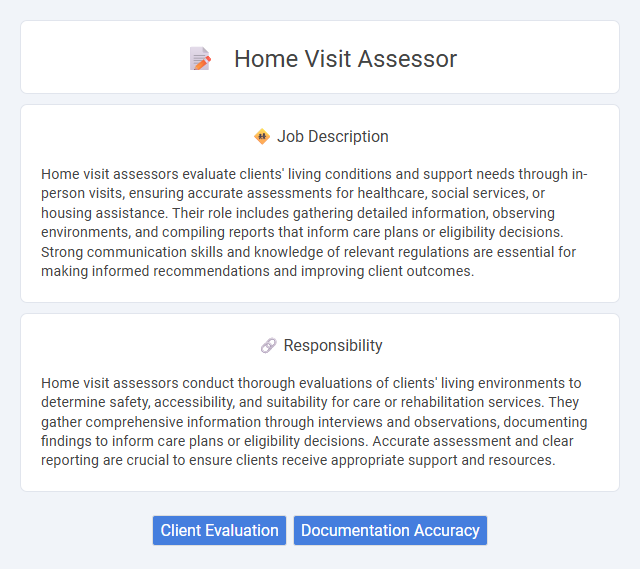
Home visit assessors evaluate clients' living conditions and support needs through in-person visits, ensuring accurate assessments for healthcare, social services, or housing assistance. Their role includes gathering detailed information, observing environments, and compiling reports that inform care plans or eligibility decisions. Strong communication skills and knowledge of relevant regulations are essential for making informed recommendations and improving client outcomes.
Home visit assessors are likely to be suitable for individuals with strong interpersonal skills and the ability to empathize with diverse clients in varying conditions. Those who can manage unpredictable environments and maintain professionalism under pressure may thrive in this role. Physical stamina and emotional resilience might be important factors influencing suitability for the job.
Qualification
A Home Visit Assessor typically requires qualifications such as a background in healthcare, social work, or related fields, often holding a degree or certification in nursing, social care, or occupational therapy. Essential skills include strong communication, assessment expertise, and the ability to evaluate individuals' living environments accurately. Experience in home care assessments and knowledge of relevant regulations and safety standards are critical for effective job performance.
Responsibility
Home visit assessors conduct thorough evaluations of clients' living environments to determine safety, accessibility, and suitability for care or rehabilitation services. They gather comprehensive information through interviews and observations, documenting findings to inform care plans or eligibility decisions. Accurate assessment and clear reporting are crucial to ensure clients receive appropriate support and resources.
Benefit
Home visit assessor roles probably offer flexible scheduling that suits diverse lifestyles, increasing work-life balance for many professionals. The job may provide opportunities for meaningful community impact by evaluating and supporting individuals in their own environments. Potential benefits also include gaining firsthand insights into clients' living conditions, which could enhance assessment accuracy and career development.
Challenge
The role of a home visit assessor likely involves navigating complex household dynamics and assessing varied living conditions, which presents consistent challenges. Interpreting diverse client needs and maintaining objectivity during evaluations might require strong interpersonal skills and adaptability. Successfully managing these difficulties could improve accuracy and reliability in home assessment reports.
Career Advancement
Home visit assessor roles offer significant career advancement opportunities through specialized training in risk assessment, client evaluation, and report writing. Professionals often progress to senior assessor positions or transition into management roles overseeing multiple assessment teams. Developing expertise in regulatory compliance and data analysis further enhances prospects for promotion within social services or healthcare sectors.
Key Terms
Client Evaluation
Home visit assessors conduct thorough client evaluations to determine needs, conditions, and eligibility for services. They gather detailed information through observation, interviews, and standardized assessment tools to create accurate and comprehensive reports. These evaluations are critical for tailoring care plans and ensuring appropriate resource allocation.
Documentation Accuracy
Home visit assessors ensure documentation accuracy by meticulously recording client information, assessment findings, and care recommendations during each visit. Precise documentation supports compliance with regulatory standards and facilitates effective communication among healthcare providers. Accurate records contribute to improved patient outcomes and audit readiness in home care services.
 kuljobs.com
kuljobs.com